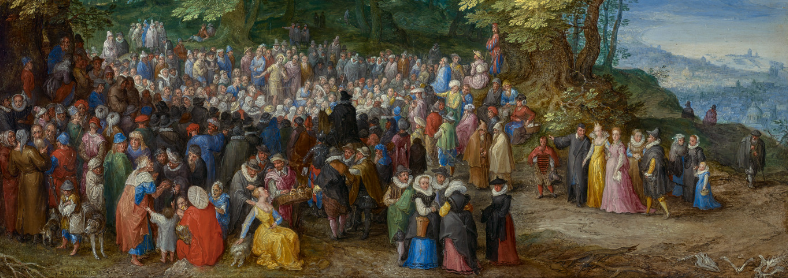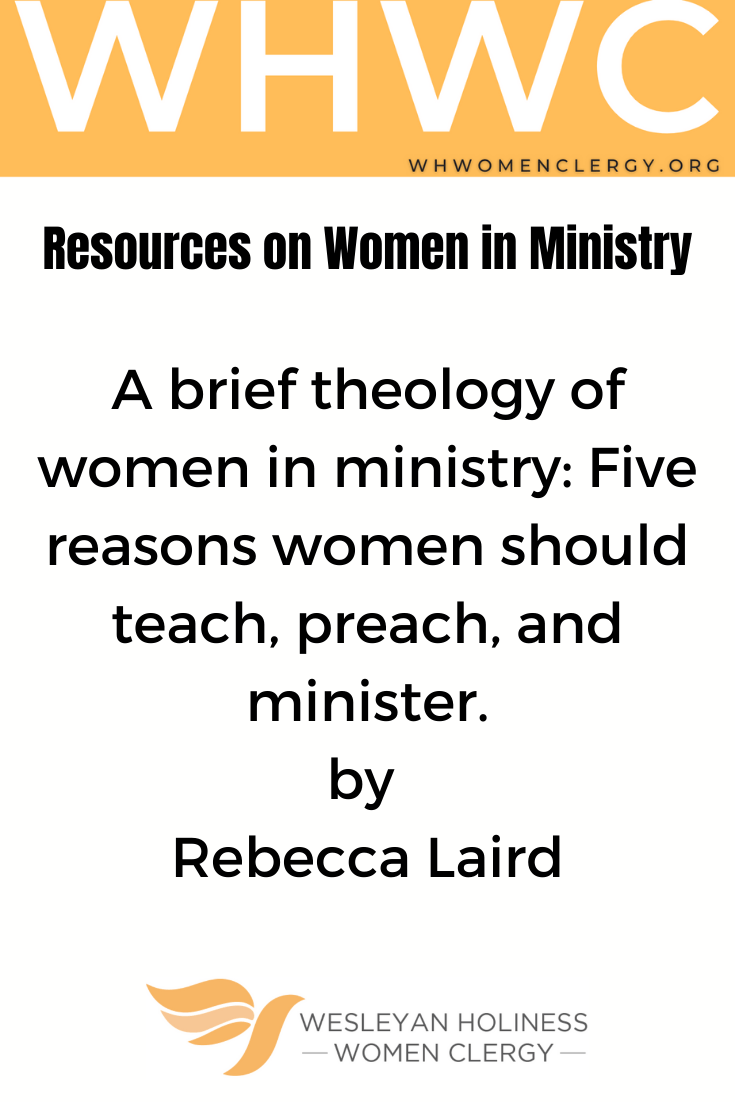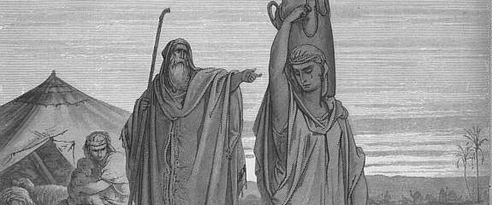A Brief Theology of Women in Ministry
Rebecca Laird • October 6, 2021 | WHWC
Download Article as PDF
Five Reasons Women Should Teach, Preach, and Minister
Laird, R. (1992, Spring). “A brief theology of women in ministry: Five reasons women should teach, preach, and minister.” GROW, 46–50.
No wise person begins building a strong house by trying to hang windows before the foundation and framing are completed. Yet that is often the approach taken when forming a so-called biblical view of women in ministry. Many people quickly parrot the phrase, "Women should keep silent in the churches" (I Cor. 14:33), or others like the idea and declare that God never intended for women to preach, teach, or lead the church.
But these New Testament verses should be seen as windows that give us glimpses into what was happening inside the walls of the early church; they reveal the struggles these churches faced in living and worshiping together. These verses serve most of all to remind us that our struggles to live harmoniously as sisters and brothers in Christ is nothing new.
Yet the verses that seem upon first glance to disallow women the right to ministry fail to deal with four foundational truths upon which the Christian faith is built.
Equality in Creation
Let us begin at the beginning. The first two chapters of Genesis recount two descriptions of how God created the world and humankind. The first account indisputably says that after God created the heavens and the earth, light and dark, plants and animals, He created both man and woman in the divine image.
Both women and men are made to be like God. There is no hierarchy in this creation story. In the first story in Genesis, man and woman are created much like twins are born. Together male and female share the honor of being God's children. And to these offspring God gives the responsibility for caring for every other living thing in creation. This story ends with the reminder that God declares that both man and woman are very good. God does not declare that one is better or more suited to lead. That idea is our own and not God's.
The second chapter of Genesis tells the story of creation in a different sequence. God made the earth, then made man from the earth and breathed life into him. Then God made the plants and animals. Then God decided that man needed a "helper" and created the first woman.
Over the centuries many have tried to use this story as evidence that women are subordinate to men because woman was created from and chronologically after man. To logically follow this argument, men must be subordinate to dirt because that is what they were formed from and after.
This story was never intended to set up a universal model that substantiates the absolute leadership of men. To focus on the fact that man preceded the woman in creation by a short time is to enter into a squabble between twins that because one was born four minutes before the other, he always gets to go first, make every decision and take the lead in everything for all time. No family can exist under that kind of tyranny; we were never meant to.
Being first born was important as a Jewish means of determining the right of inheritance, but that is not the gospel way of determining inheritance. All who are born through Christ are joint heirs, equal inheritors of God's love and God's mission. The other tidbit of this second creation story that is used as "proof" that women cannot provide leadership in the church is taken from the designation that women were made to be man's "helper." Some think this means that woman's role is to enable man to fulfill his work in the world and his ministry in the church. Somehow this idea has been wrongly interpreted to mean that women are to be fulfilled by enabling men to succeed by doing all of the private, domestic, and clerical work for men. But the word "helper" that is used here could be better understood if translated as "counterpart" or "partner." Indeed, this very word is used when referring to God as the "helper" of Israel. Israel needed God's strength, guidance, and leadership skills. Together, side by side, in life and in ministry, men and women are one flesh, the whole of humanity.
Finally, what the creation accounts teach is that women and men were created equally good with shared responsibilities and the task of helping one another care for every living thing. If this is the teaching of creation, then women share with men the divine nature and responsibility for the church. Women are men's counterparts and peers in ministry. The one who does the decision-making and preaching is more a matter of aptitude and calling than of gender.
Equality in Redemption
Back at creation both Adam and Eve disobeyed God and sinned. And neither male nor female has a plausible case for innocence. But even though we all know deep inside that we have sinned, we often fool ourselves into feeling better by thinking someone else is more to blame.
Now those same people that like to say that Adam was created first are quick to point out that Eve sinned first and somehow that makes women more prone to sin. It should be noted, however, that using this logic has its traps. In Genesis 2, God tells the man not to eat of the tree of knowledge. This all happens before the woman was even created. If anyone should have known better, it was Adam. God gave him a direct, unequivocal command; Eve only heard it secondhand.
The real truth of sin is that both man and woman disobeyed. Genesis tells us that Adam was with Eve when she took and ate of the forbidden fruit. He was standing right there and did likewise. Imagine, if you will, that two people walk into a grocery store and both steal a piece of fruit; is the one whose hand grabbed it first more guilty of theft than the other?
Men and women both stand guilty of sin. That is the truth—the bad news.
The equally true good news is that Christ came to redeem us all and to set the world aright. Christ came to restore a right relationship between God and humanity. Christ also came to restore a right relationship between human beings, Jew and Greek, slave and free, male and female.
One of the marks of sin is our disunity, our categorizing, our domination over one another. (Some want to justify women's subordination by citing Genesis 3:16 after the Fall when God says to the woman, "and he shall rule over you." But remember, this is after the Fall, after sin. God is outlining the consequences of sin, not the divine intention.)
For centuries groups of people have been jockeying for position at the expense of others. Whites have subordinated people of color. Men have used physical strength to put women "in their places." That is and always will be sin.
When Paul wrote the profound credo of freedom and equality found in Galatians 3:28, he declared that redemption in Christ made change possible for the human heart and human society. Full redemption is both personal and social.
Paul, for most of his adult life, had been a zealous Jew. Good Jewish men faithfully recited the traditional morning prayer which gave thanks to God that "thou hast not made me a Gentile, a slave or a woman."
Paul, the man who became the great missionary and apostle, spent most of his life as a privileged, educated, haughty, religious man who accepted as fact the social realities of his day. He assumed that Jews were superior to Greeks, free citizens were more worthy than slaves, and men were unquestionably better than women. But Christ seared his world view with the truth on the road to Damascus. His whole world view changed. He then knew a deeper truth—he was no better, no less than his sisters and his brothers in faith.
Once Paul knew the truth, he proclaimed it. He preached Christ to be the great equalizer, which He is. Paul also tried to live it, but he, like us, found it difficult. Paul lived in a world where the kingdom of God had been revealed but was not yet a reality. We live in the same kind of world. Paul lived in the tension between what he knew to be true and what he found to be the present reality of the church. When the church at Corinth was fraught with divisions and factions, he adjudicated the fracas. Lots of outlandish things happen in the church, then and now.
In the church at Corinth, someone was sexually immoral, and people were squabbling about what should be done. Paul was forced to make several judgment calls (I Cor. 7). Women who became believers had unbelieving husbands; what were their marital responsibilities now that their lives had changed? Slaves who now knew themselves to be free in Christ agitated for social freedom.
Women were speaking in church and outsiders considered that scandalous. Paul was called in to restore peace. He basically told people to accept their previous stations in life so that the fabric of the church would not be ripped apart. He told women to cover their heads according to custom when they prophesied. But he never told women to stop prophesying in public. Disorder reigned in the Corinthian church and in its worship. People spoke in tongues. People with a prophecy stood up and talked over each other. Women who had questions about what was going on asked their husbands, who in a traditional setting would have been seated across the room. Paul told women to be silent in church and save their questions for home. It seems there was no order in their worship.
When Paul silenced the women, his words were meant to keep the church from disorderly conduct. Paul's words were never meant to be taken out of this context and made into a universal principle to keep women out of public ministry. These words were and are pastoral wisdom given from an elder when called upon to try to settle disputes in a local church.
In this chaotic situation, Paul pleaded for unity and order. He made this proclamation for the common good of a local church during a very troubled time.
When reading Paul's epistles, it is helpful to recall his great themes, and his great concerns reach well beyond what he found in the Corinthian church. Paul cared most about freedom and equality in Christ, justification by faith, and unity in the body of believers. Paul proclaimed us to be joint heirs with Jesus. And joint heirs bear the equally heavy burden of sin and can equally claim full redemption and freedom in Christ.
Equality in Call
Jesus changed everything for His followers when He walked into their lives and called, "Come and follow me." Jesus called the twelve apostles and they left everything to follow Him.
Jesus changed everything for His women followers, too. And there were many. Women in Jesus' day were not allowed to study the Scriptures or be instructed in the faith. Women were hidden behind veils and mostly secluded in their homes. Rabbis or church leaders did not publicly speak to women, not even to their wives or daughters. Women did not speak in public.
But Jesus changed everything. Jesus bade Mary of Bethany to come out of the kitchen and sit at His feet with the other disciples as He taught them.
Jesus had many women followers who left their homes and traveled with Him and the twelve disciples. Luke 8 tells us that Mary Magdalene, Joanna, and Susanna went from city to village with Him.
Jesus talked to women in public. He talked to the woman with the hemorrhage and healed her. In doing so Jesus broke the law. For a religious leader to touch a bleeding woman was scandalous. But Jesus was not afraid of proclaiming the good news of full liberation and freedom to women.
Jesus talked to the Samaritan woman at the well. A Jew would not speak to a Samaritan and a man would not speak to a woman, but Jesus did, and He spoke to her in front of everyone.
It was no accident that Jesus affirmed women. Jesus placed a high priority on touching, talking to, and calling those who were excluded from positions of leadership and power in the society of His day. Jesus came to proclaim a new way for Jew and Greek, men and women, slave and free, to live together.
Equality in Example
In the gospel of Luke, the story is recorded that on the third day after the crucifixion of Jesus, Mary Magdalene, Mary the mother of James, and Joanna went to the tomb to anoint His body. But when the three women arrived at the tomb, Jesus' body was gone. Disappeared.
An angel appeared to the women and they ran to tell the disciples. But the disciples did not believe the women. Their stories sounded like "nonsense" to them.
The gospel of John also recounts the resurrection, and in this record only Mary Magdalene stays at the tomb. The other disciples went away in despair and disbelief.
Mary wept when she saw Jesus' body was gone. Angels appeared to ask her why she was crying. When she turned from them, there stood Jesus.
Jesus said to her, "Go to my brothers and tell them I am returning to my Father, your Father, to my God and your God."
Jesus, himself, gave the command and the privilege of testifying to the resurrection to a woman because she remained faithful.
Jesus still calls women to tell the story of resurrection, the story of freedom, the story of His God and their God. Jesus calls women to preach, teach, and minister.
Equality in Empowerment
On the day of Pentecost, Acts 2 tells of the faith-changing events when the believers in Jerusalem and many international visitors were "all together in one place." The Holy Spirit was poured out that day on all flesh, not just male flesh, not just Jewish flesh. People from many nations, races, and languages were given the power to proclaim the truth of their experience.
When Peter stood to address this diverse and noisy crowd, he reminded them and he reminds us of the Old Testament promise, "In the last days, God says, ‘I will pour out my Spirit on all people. Your sons and daughters will prophesy. . . Even on my servants, both men and women, I will pour out my Spirit in those days'" (Acts 2:16–18).
Peter clearly announces the truth—the Spirit is available to empower all people to prophesy, to preach. Everyone on whom the Spirit is poured is free to prophesy, to speak up about what God has done.
Some contemporary Christians like to qualify the freedom given women to prophesy by making a distinction between prophesying and preaching. They concede that women might be free to speak up when so moved, but women still should not preach or lead. Why not? Women did in the early church.
Women can be found everywhere between the lines of the New Testament. In Romans 16 Phoebe the deacon is mentioned. (Many Bible translations designate Phoebe as a helper or deaconess and call the men deacons. However, the same word is used in original texts for all "deacons." Phoebe and the male deacons held the same position in the early church.)
In the same chapter Mary, Tryphaena, Tryphosa, Persis, Julia, Nereus' sister, and Olympas are listed as workers in the Lord. Euodia and Syntyche worked side by side with Paul, and be assured they were not just pouring tea (Phil. 4:2). Priscilla earned the title as Paul's "co-worker in Christ." Romans also records that she and her husband "risked their lives" for Paul and had a church in their home. In Acts 21 the four unmarried daughters of Philip are described as prophets. There are many others. These were Spirit-filled women who preached, taught, prophesied, and risked their lives for the cause of Christ.
The Christian church was born on Pentecost, the day when the Spirit was poured out. Those that believed and began to spread the word were from many nations, many races, and both genders. The equality of empowerment is one of the characteristics of the truly Spirit-filled church.
Conclusions
The house of God's truth about women in ministry stands on four bedrock truths: equality in creation, equality in redemption, equality in call, and equality in empowerment.
A theology of women in ministry must be built on this foundation. Women are free and qualified to preach, teach, and minister because God has created woman in the divine image and declared that she is good. God has provided a way to fully redeem women and all of fallen humanity. Jesus has called all who witness to the resurrection in their lives to proclaim the amazing news of new life to others. And the Holy Spirit has been poured out to empower all flesh, including women's flesh.
The house that God has built has its doors thrown wide open to all who would enter in. Women have always come to the house of God willingly to serve. But women are free to preach and teach. Women can also minister and lead.
God's house is a house where women and men are called to work together and learn to honor each other as God's good creation.
Rebecca Laird is Professor of Christian Ministry and Practice at Point Loma Nazarene University. She is also a freelance editor and writer who specializes in spirituality and social justice.
Enjoyed this article? Connect with us on one of our social media platforms. Share it and forward it to a friend:

Wesleyan Holiness has a rich and diverse history of women empowered by the Holy Spirit following God in obedience to Him, blocking out the voices of those who didn't embrace or encourage women preachers. Each one of them are the women whose shoulders we stand upon, making way for the next generation of women pastors coming up behind us.

The wonderfully freeing truth we have in the Beatitudes is that they are not a checklist of to-dos and rules to hem us in, keep us in line, or that we must check off. The Beatitudes are words given to us as grace, dripping like honey from a honeycomb with blessing and hope in a desperate and broken world.



